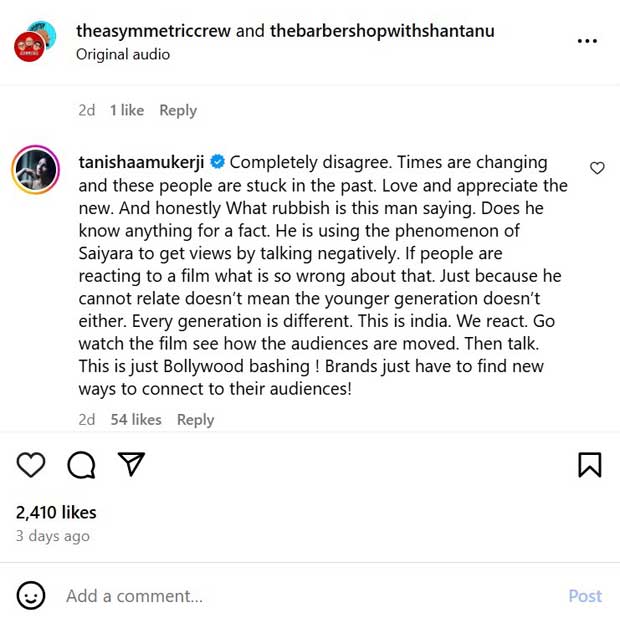Tanishaa Mukerji has come out strongly in defense of the recently released romantic musical Saiyaara after a controversial claim surfaced accusing the film’s team of paying Gen-Z audiences to fake emotional scenes in theatres for promotional gain. The allegation was made during an episode of The Asymmetric Crew podcast, featuring the creator of The Barber Shop with Shantanu. During a frank discussion, one speaker asserted that the tearful reactions witnessed in theatres after Saiyaara screenings were staged.
He claimed, “The producer of this movie, in my view, has paid ₹500 in dehadi to lots of these Gen-Z young folks to go into these theatres and put on emotional performances of crying… This is how the movie is getting promoted by the way. The whole world has now become a bunch of performers.” The statement quickly ignited outrage across social media platforms.Responding sharply, actress and producer Tanishaa Mukerji dismissed the accusation as baseless and outdated. “Completely disagree. Times are changing and these people are stuck in the past. Love and appreciate the new. And honestly, what rubbish is this man saying? Does he know anything for a fact?
He is using the phenomenon of Saiyaara to get views by talking negatively. If people are reacting to a film, what is so wrong about that? Just because he cannot relate doesn’t mean the younger generation doesn’t either. Every generation is different. This is India. We react. Go watch the film, see how the audiences are moved. Then talk. This is just Bollywood bashing! Brands just have to find new ways to connect to their audiences!” Tanishaa said in a strongly worded statement. Since its release, Saiyaara has become a cultural touchstone, especially among younger viewers. 

The film marks the Bollywood debut of Ahaan Panday, nephew of veteran actor Chunky Panday, alongside newcomer Aneet Padda. Directed by Mohit Suri and produced by Yash Raj Films, Saiyaara blends soulful music with an intense love story, resonating deeply with its audience.While the debate continues over modern film marketing strategies and audience behavior, Tanishaa Mukerji’s defense has sparked a meaningful conversation about generational differences and how emotion-driven content connects with evolving viewers today.

